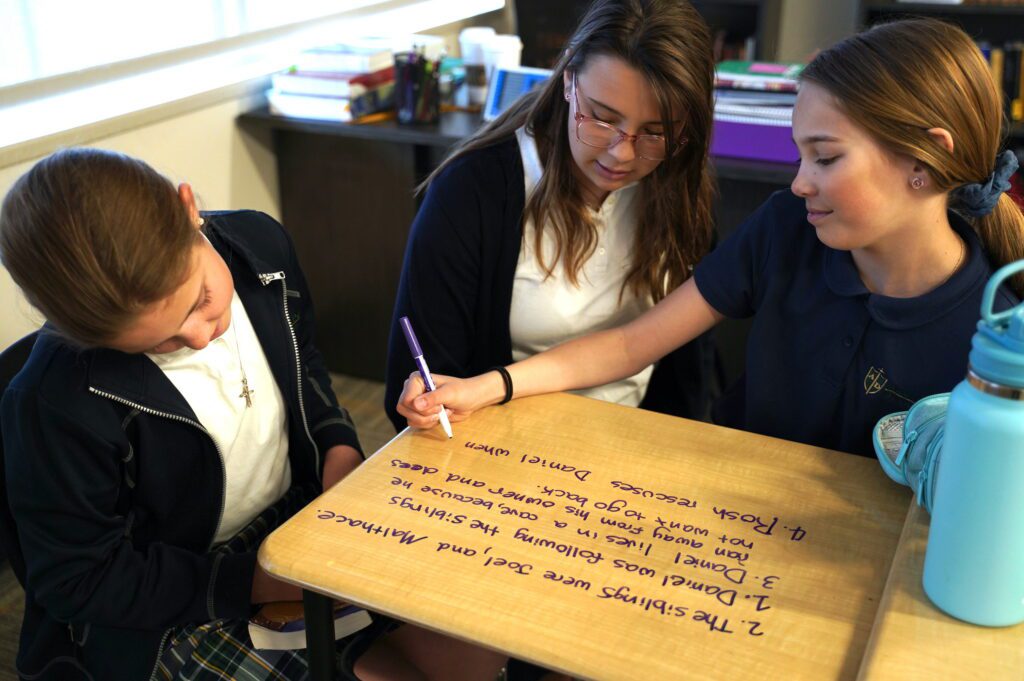Students’ thinking must be established upon the solid foundation of truth and absolutes. The Bible is the source of all truth and the final authority.
Sixth grade Bible focuses on the story of the world, beginning with creation and the fall, and continuing through to God’s plan for redemption and restoration. Students will examine God’s Word beginning in Genesis 1:1 and continuing through the Acts of the apostles and the establishment of the church.
The students will learn, through memorization, recitation and logic-level tools, about God’s role in the life of His people throughout history and learn to take the scriptures to heart using them in their lives when opportunities arise.
- The Pentateuch
- Historical Books
- Wisdom Literature: Psalms, Proverbs
- Ecclesiastes
- The Prophets
- The Gospels
- Acts and the early church
Students continue to refine their chronological thinking skills, while at the same time develop a greater aptitude for historical comprehension.
As the year progresses, their abilities to compare and contrast differing sets of ideas and consider multiple perspectives will be refined.
Harnessing Harkness discussion capacities will enable them to challenge modern meta-narratives and to hypothesize the influence of the past using primary sources to support their findings.
Their historical research capabilities will be refined throughout the sixth grade year.
Geography of the historical time period is taught concurrently with history and literature.
- Pre-Greece History and Archaeology/7 Continents
- Egypt and the Sumerians
- Ancient India, China, Africa and the Phoenicians
- Assyrians and the Americas
- The Depression
- Athens, Sparta, Herodotus/Poles of the Earth
- Greek Gods, Greek Wars and Alexander the Great
- China/Asia
- Rome’s Rise & Downfall
- Augustine and Early Christian Teaching, Martyrs for the Faith
- Fall of Western Roman Empire, Eastern Empire and Constantine
Students will engage in activities to analyze the meaning of words using key ideas and details, and to integrate what they know through a variety of compare and contrast exercises.
Vocabulary study will develop their abilities to understand words based on their Latin and Greek roots.
Composition exercises will develop their critical thinking skills and ability to express themselves clearly and succinctly.
- Tales of Ancient Egypt by Roger Lancelyn Green (a Puffin Classic)
- The Golden Goblet by Eloise McGraw
- Famous Men of Greece by John Haaren
- Three Greek Children by Alfred J. Church
- Outcast by Rosemary Sutcliffe
- Famous Men of Rome by John Haaren
- Stories from Homer by Alfred J. Church
- The Aeneid for Boys and Girls by Alfred J. Church
- The Bronze Bow by Elizabeth Speare
- Institute for Excellence in Writing and teacher-created materials
Students expand their knowledge of Latin vocabulary/grammar and improve their ability to translate Latin sentences into English.
Translation texts, drawn primarily from Libellus de Historia, Primer C, will reinforce their knowledge of American history and Roman mythology.
- Expand their Latin vocabulary and grow in their ability to identify English derivatives of Latin words.
- Acquire the skills necessary to translate complex Latin sentences.
- Learn and recite/sing historic Christian prayers and songs, "Pater Noster," the "Benedictio post Mensam," "the Actus Spei," and a version of "Gloria Patri."
Using the Math in Focus Course 1 textbook, students build on the foundation of mathematical comprehension established in the Grammar School and continue in their study of numbers, learning different ways to communicate through mathematics.
- Solve real-world problems involving ratios and rates.
- Find speed, distance, or time using the speed formula.
- Use and find percents in real-world situations.
- Write, evaluate, simplify, expand, and factor algebraic expressions.
- Solve and write linear equations.
- Find the area of triangles, parallelograms, trapezoids, composite figures, and other polygons.
- Find the circumference and area of a circle.
- Find the surface area and volume of prisms pyramids.
- The student will be able to find the mean, median, and mode of a set of data.
Life science uses a mastery-oriented curriculum which focuses on topics such as defining and classifying life, various systems of the human body, and life’s energy cycle.
Throughout the course, students will learn and utilize the scientific method and document most work in a formal scientific lab book. Students will consider the changes in their world-view and how it affects them and their beliefs.
- Define and classify life, the structure of the human body, life’s energy cycle, and various systems of the human body.
- Describe the steps of the scientific method, why they are necessary for a valid
controlled experiment, and why this method has enabled science to be successful over the past few hundred years. - Formulate a quantitative hypothesis. and identify independent, dependent variables and experimental controls.
- Collect data and set up scientific graphs with appropriate labels and scales.
- Apply convincing reasoning to analysis and discussion of experimental results.
Write an effective lab report. - Show proficiency in the use of the engineering design process.
Meeting once per week, students will be introduced to the study of logic through brain teasers and logical fallacies.
Students will then be asked to apply the logical thinking they have learned to their discussions in literature and history.
Music class emphasizes ear training and vocal warm-ups, rhythm clapping, and singing. Each week students explore the life of a composer and listen to or watch a short orchestra or band selection of that composer’s work. Students practice for upcoming programs, chapel performances, and grade level songs for scripture memory.
Students work with various instruments throughout the program, including beautiful Orff Instruments, recorders, handheld rhythm instruments, piano keyboards, and guitars.
- Master the use of varied lines and shapes
- Practice guided drawing and painting techniques
- Create still life compositions using contour line drawing and shading of forms
- Draw and paint art from American history
- 3-D sculpture
- Complete canvas painting
God has knit us together in wondrous ways as human beings.
Students in Physical Education will be learning about how the human body moves and functions in sports and exercise.
Proper stretching, hydration and nutrition, warm-ups, sports safety, team building, sportsmanship, and many other life lessons will be taught!
- Learn to properly stretch and warm up before activity to avoid injury.
- Be instructed on hydration and nutrition regarding optimal physical activity.
- Experience a variety of physical games and activities throughout the year.
- Interpret how God’s design and intent relate to movement and physicality.
- Learn about Godly sportsmanship and how it relates to all areas of life.
- Experience joy through physical movement and God’s design for us in this world.
- Build strong bonds between each other due to shared sports activity.
- Glorify God by building strong minds and bodies.




